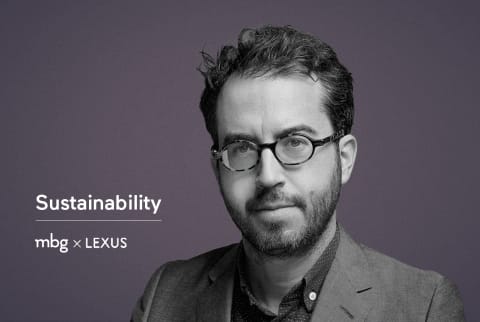Advertisement
How To Talk To Others About Saving The Planet (Without Getting Angry)

When it comes to climate change, there's much to parse. That's why environmental activist and bestselling author of We Are the Weather Jonathan Safran Foer approaches the monstrous issue from a bottom-up perspective, one building block at a time. "We cannot save the planet with micro-changes. We cannot save the planet without micro-changes," he mentions on a special episode of the mindbodygreen podcast with early release to guests of the Lexus Retreats in Motion program. Meaning, it takes both systemic shifts and mundane change in our daily lives to create a real shift: "We need leaders who legislate change. We need different corporate practices. We can't do it without those things, but we also can't do it unless individuals reshape their own habits."
Sign up for one of the Lexus Retreats in Motion programs, and you'll hear Foer's perspective on how individuals can move the needle in terms of climate change, how to facilitate an intimate relationship with nature, and what we've gotten wrong when it comes to talking about diet. With the latter, he notes, "When it becomes a question of identity, people become afraid. Most people are not ready to make a pretty dramatic identity shift, and it's not because they're bad or ignorant or lazy. It's scary to depart from habits." Meaning, most people identify with their nutrition choices—be it vegan, vegetarian, keto, or something else entirely—which makes the choice seem like a bigger lifestyle shift than it needs to be. "We need to make a shift away from an all-or-nothing choice to wanting our universal values reflected in our daily actions," he adds.
He also discusses how to teach others about climate change—without sounding defensive or preachy. The key? Sprinkle in some humility and a little sense of humor (really!). "I find that sharing my own struggles, my doubts, my own uncertainty allows people to feel safer," he explains. "The people who have changed me most, it's almost never because of an argument. It's almost always because of witnessing the choices they make and being drawn to ask about them rather than being put on the defensive." According to Foer, human experience is sometimes more compelling than the tightest three-tiered argument.
He closes with advice on how to stay motivated when things feel overwhelming or too complex to handle: The ticket, says Safran Foer, is to create a concrete plan you know you'll stick to. "I really revere the kind of person who says, 'I'm going to eat vegan two days a week,' [as opposed to], 'I'm going to eat vegetarian the rest of the time unless my friends serve me meat,'" he explains. He also suggests approaching issues one at a time—there's no reason to reinvent multiple wheels, here. There's a multitude of concerns you may have (understandably so; saving the planet is a complex issue!), but he urges you to do your best to compartmentalize. "Navigating competing concerns takes not only a kind of intelligence, but it's risky," he says. "It's risky to say, 'This matters to me now, but this also matters to me now.'" To hit all your goals, approach them one by one—a mantra you can apply to any facet of your life, really. That way, tackling even the biggest issues won't feel as daunting.
